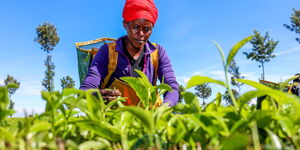President Uhuru Kenyatta has banked on mega infrastructure projects to solve problems in Kenya's energy, transport and water sectors.
Water shortage has been a common nuisance affecting many Nairobi estates with most administrations pointing the finger at cartels who mint money from desperate residents.
The government is still in the dark on how soon it can guarantee Nairobians enough water for domestic use, but key projects in water collection and distribution have been ideated to take a stab at the problem.
Karimenu II Dam.
The ongoing construction of the Karimenu II dam in Gatundu is expected to add 23,000 cubic meters of water to the existing capacity. Karimenu II Dam is intended to supply water to Ruiru-Juja towns and the adjoining areas. The Project is located in Kiambu County, 75Km North of Nairobi and will be constructed across Karimenu River.
The project is currently at 45% completion and entails construction of a 59m high dam, water treatment plant of capacity 70 Million litres per day, 67 km of a raw and treated water transmission pipeline and two concrete water storage tanks in Ruiru and Juja each with a capacity of 23.5 Million litres and 3 Million litres.
Northern Collector Tunnel.
The project entails construction of an 11.8km underground tunnel that draws flood water from Maragua River, Gikigie River and Irati River.
It is derived from the Nairobi Water Master Plan for Developing New Water Sources for Nairobi and 13 Satellite Towns namely Kikuyu, Ruiru-Juja, Kiambu, Karuri, Githunguri, Mavoko Municipality, Ngong Township, Ongata Rongai, Thika, Gatundu, Limuru, Lari and Tala-Kangundo.
The Northern Collector Tunnel Phase 1 includes river diversion and related intake hydraulic structures at Maragua, Gikigie and Irati Rivers as well as construction of river outlet at Githika River which will convey the additional water to Thika dam. The tunnel is approximately 11.8km long and of 3m finished internal diameter. The objective of this project is to increase water supply in Nairobi County by 121,000m3 per day.
Nairobi City Water Distribution Network Modifications.
This project will be carried out in three lots. The first part involves the Kabete-Uthiru-Karen pipeline, which consists of laying 14km pipeline, construction of 5 Million litre capacity reinforced concrete water storage tank, upgrading of the Kabete pumping Station and construction of 500,000 litre tank and pumping station at Kenya high school.
It will also involve the extension of water and sewerage services in peri-urban and informal settlements.
The final part will include the construction of the 14km eastern transmission (Kiambu – Embakasi) Pipeline.
Kenya Towns Sustainable Water Supply and Sanitation Program.
Funded by the African development bank, the project aims to improve the access, quality, availability and sustainability of water and wastewater services in regional centres and towns.
It will see the construction of the Gatundu Water Supply and Sewerage Project, Kikuyu water and sewerage project, Limuru water and sewerage project, Kiambu and Ruaka water and sewerage works, Makutano Water and Sewerage Project, Pemba Intake water supply project, Machakos Water Supply Project and Machakos Sewerage Project within the metropilitan area.












